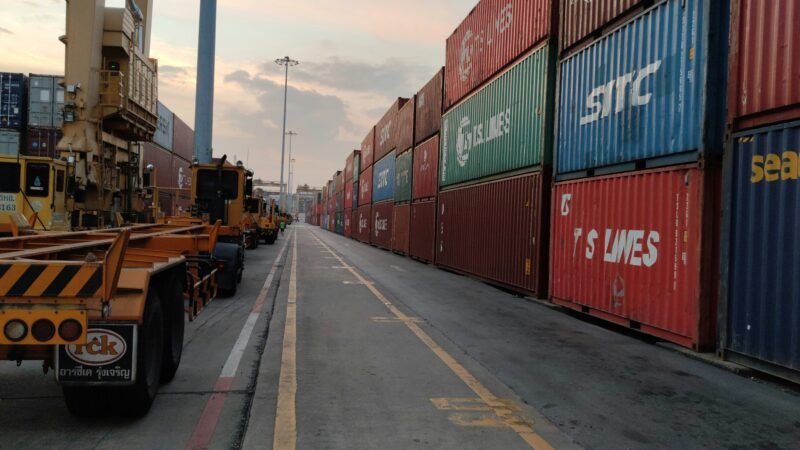When Tariff Shortages Arrive, Here's What Might Be Missing
Sex toys, blenders, baby strollers, microwaves, hair dryers, and other affordable goods that Americans take for granted could soon be in short supply.

A shipping slowdown at West Coast ports is the latest in a series of dominoes that could lead to tariff-induced shortages in American stores.
Import volume will be down by about a third this week, Gene Seroka, executive director of the Port of Los Angeles, told a Bloomberg panel on Friday.
"The trucker hauling four or five containers today, next week she probably hauls two or three," he said. "The dockworkers are no longer going to see overtime and double-shifts, they're going to probably work less than a traditional work-week right off the bat."
Seroka's port is an important bellwether for trade into the United States: About 40 percent of the shipping containers brought into the country arrive in Los Angeles. By comparison, container arrivals at the port dropped by about 30 percent in March 2020 as the COVID-19 pandemic hit. If Seroka's estimates are correct—and data from websites that track shipping activity suggest they are—then the country may be headed for a supply chain disruption on par with the pandemic.
The biggest difference is that this mess is a deliberate choice. The Trump administration has imposed a 10 percent universal tariff on nearly all imports to the U.S., with tariffs of 145 percent on goods from China. (Higher tariffs on dozens of other countries are currently on hold for 90 days but could be implemented at any time.)
"Global trade is going to slow; economies will follow," predicted Seroka.
So when will shortages begin hitting consumers, and what products will be most affected?
Late last month, the CEOs of Walmart, Target, and Home Depot reportedly met with President Donald Trump to deliver a stark warning: Store shelves could be noticeably emptier within a few weeks, as inventories vanish and cannot be restocked. "He was told that shelves will be empty," an anonymous Trump staffer told Axios after the meeting.
Because of the extraordinarily high tariffs on China, those imports will likely be the first to disappear from stores.
The 10 percent global tariff will likely increase prices for consumers but won't shift or eliminate supply chains for products from other countries, writes Ed Gresser, a former assistant U.S. Trade Representative who is now a vice president at the Progressive Policy Institute. It's a different story for goods from China, where the 145 percent tariff will be prohibitively expensive and may look more like an embargo.
"As the prices of many foods, most clothing and shoes, back-to-school goods, and much else rise, a swathe of cheap and popular mid-range home goods—blenders and alarm clocks, umbrellas and strollers, sex toys and toasters—might vanish altogether," Gresser reports.
The data Gresser compiled on Chinese imports suggests that you should add hair dryers and microwaves to that list. Other basic necessities, such as toothbrushes and vacuum cleaners, could see shortages as well.
The next month (and possibly more) will be a real-world test of the administration's belief that Americans don't really need affordable and plentiful items like those on Gresser's list. Treasury Secretary Scott Bessent said in March that "access to cheap goods is not the essence of the American dream." More recently, Trump has doubled down on his claim that American families can afford to pay more to buy things like dolls and children's toys. They may find themselves paying more for just about everything else that can be found in a modern American home too.
"Americans will be deciding over the next months whether Bessent is right," wrote Gresser. "More personally and locally, if you're looking to restock your kitchen, bathroom, bedroom, workbench, home office, etc. with small but useful things this year, do it now."


Show Comments (123)